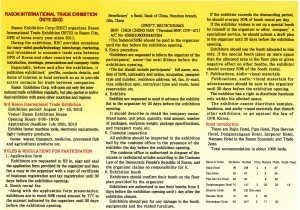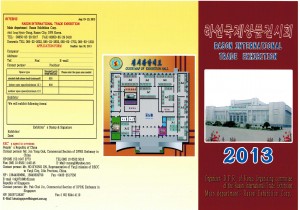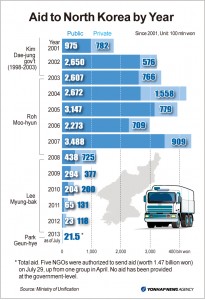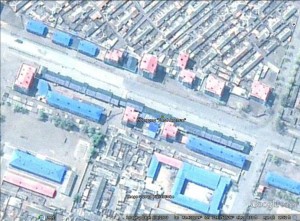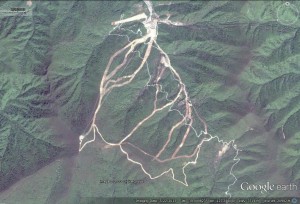
Pictured above: Masik Pass Ski Resort under construction (Google Earth: 2013-5-22)
UPDATE 11 (2013-8-27): Koryo Tours posts images of the new resort and offers a status update.
UPDATE 10 (2013-8-19): Switzerland bans the export of ski lifts to the DPRK. According to Reuters:
Switzerland has banned the sale to North Korea of equipment for a luxury ski resort planned for the ruling elite in the widely impoverished state that is under U.N. sanctions, officials said on Monday.
North Korean leader Kim Jung-un, who studied under an assumed name in the Swiss capital Berne and is believed to have gone on school ski trips in the Alps, wants to develop leisure activities for tourists and the upper crust among its 23 million citizens.
North Korea approached several Swiss companies, including Bartholet Maschinenbau AG, to provide chair lifts and cable cars worth 7 million Swiss francs ($7.57 million) for its sprawling Masik resort, the Geneva daily Le Temps reported on Monday.
But the Swiss government, contacted by the firms for clearance, added luxury sporting equipment to its list of goods banned under United Nations sanctions, Marie Avet of the State Secretariat for Economic Affairs (SECO) said.
“The Federal Council decided on July 3 to also put infrastructure for sports facilities on the list, especially when they have a more luxury character for resorts,” Avet told Reuters. “These resorts have a luxury character, that is why it is not appropriate to export.”
The neutral country’s sanctions list for the Democratic People’s Republic of Korea (DPRK) also includes equipment for golf, horseback riding, water sports, billiards and casinos, as well as luxury watches, jewellery, caviar, perfume and artworks.
See also this NK News article.
UPDATE 9 (2013-8-17): KCNA reports on the progress made at the ski resort.
Soldier-builders, mobilized in the construction of the Ski Resort on Masik Pass, have finished in July the building of structures of hotel, service and welfare facilities and scores of blocks of dwelling houses in the spirit of the “Masikryong Speed”, paving a way for rounding off the project this year.
UPDATE 8 (2013-8-17): KCNA reports that Kim Jong-un visits the Masik Pass Resort.
UPDATE 7 (2013-8-16): KCNA reports on the progress made at the resort:
The soldier builders have completed the walling of dozens of structures including hotels, lodging quarters, resting grounds, underground parking lot, garages and welfare facilities. They are now pushing ahead with the plastering of interior and exterior walls of those buildings.
They are fulfilling their daily plastering work plan over 300 percent by giving definite priority to the preceding processes and closely following them up with new processes.
They are dynamically spurring the construction despite such bad whether conditions as untimely downpours and continuous sultriness.
Thanks to their devoted efforts, the starting point and mid-points of the skiing courses, resting pavilion and resting places at terminals are taking a shape.
Drivers are increasing the rate of vehicle operations to the maximum.
They are using a driving method suited to the different topographic and road conditions at high and rough mountain ranges, conducting a campaign to carry more materials, and thus pushing the supply of materials ahead of the project schedule.
A lot of units and people throughout the country are sending aid materials they prepared with sincerity to the soldier builders to encourage them.
UPDATE 6 (2013-8-12): Following the publication of this NK News report, I have been authorized to release the source, a business plan that was circulated for the Masik Pass resort.
Download the PDF here.
UPDATE 5 (2013-8-9): Choe Ryon-hae visits Masik Pass resort.
UPDATE 4 (2013-7-24): KCNA reports on the progress made at the resort:
Construction of Ski Resort on Masik Pass Progresses Apace
Pyongyang, July 24 (KCNA) — Signal achievements have been made on a daily basis at the construction site of Ski Resort on Masik Pass with the approach of the 60th anniversary of the victory in the Fatherland Liberation War.
The soldier-builders have waged a high-pitched drive to create the “speed on Masik Pass”, carrying out 55 percent of the total project and making steady progress.
A hotel has taken its shape by the devoted efforts of the soldiers.
Those in charge of the construction of service center, lodgings, underground parking lot, cable operation, heating, purification and pumping facilities are carrying out their work 1.5 times that of the schedule, two times at the maximum despite difficulties and trials.
Soldiers have spurred the reservoir project also.
Defying high altitude and unfavorable transport conditions the builders have given definite precedence to the transport of materials and over-fulfilled the daily assignments for embankment project and concrete tamping.
Innovations have also been made in the construction of dwelling houses, kindergarten, nursery and power transmission line.
The pavement of roads extending dozens of kilometers and the construction of bridges, skating ground and swimming pool have made rapid progress together with the arrangement of surrounding areas and the planting of trees and turf of good species.
UPDATE 3 (2013-7-10): KCNA reports on support workers at the resort are receiving:
Soldier-builders of Skiing Resort Inspired with Aid Materials
Pyongyang, July 10 (KCNA) — Many units, people of various circles and school youth and children in different places of the DPRK have rendered positive help to the soldier-builders of the Skiing Resort on Masik Pass.
Officials and other people of the Presidium of the Supreme People’s Assembly, Supreme Court, Korean Revolution Museum, General Bureau for Service for People and others procured lots of aid materials and visited the construction site to raise the morale of the soldier-builders.
The Cabinet, State Planning Commission and the Ministry of Metal Industry organized well the work of the relevant units to supply materials to the construction site, making the public officials turn out in the work for assisting the army.
Officials of the Ministries of Post and Telecommunications, Chemical Industry, Culture and Light Industry also presented aid materials to the soldier-builders and helped their work, encouraging them.
The hot wind of assisting the army is raging among the people in Kangwon Province to render fraternal help to the soldiers creating the new history of change in their province.
Officials and other people in Pyongyang, South Hamgyong, South Phyongan, North Hwanghae, Jagang provinces and Nampho City are dedicating all their sincerity to aiding the construction of the skiing resort.
Good deeds are done by the new generation, notably students of Changdok School in Pyongyang and Kalma Junior Secondary School in Wonsan City. They gave aid materials they sincerely procured with their families to the soldier-builders and requested them to hasten the construction.
UPDATE 2 (2013-6-13): According to Rodong Sinmun, “Masikryong Speed (마식령속도)” has become the latest propaganda slogan:
Army men, Party members and working people are now making a great stride forward, following the examples set by the soldiers in the construction of a skiing ground on Masik Pass responding to the call of the respected Marshal Kim Jong Un for a new turn on all fronts of socialist construction by creating “Masikryong Speed”.
Indeed, a new speed is being created on the skiing ground to finish the project within this year as soldier-builders give full play to their indomitable revolutionary spirit, a spirit of each being a match for a hundred.
Soldier-builders engaged in the construction of the Victorious Fatherland Liberation War Museum expect to wind up the project soon.
Reports of innovatory successes also come from many other construction sites such as the Munsu Wading Pool, the Mirim Riding Club and the Cemetery of Fallen Heroes of the Korean People’s Army.
At the second-stage construction of the Huichon Power Station and in the reclamation of the Sepho Tableland one can witness the vigorous labor endeavors of soldiers and working people for another leap in socialist construction.
A new speed known as “Masikryong Speed” calls for a new upsurge all through the country such as in the project for increasing the Kosan Fruit Farm’s capacity and the project for cutting water ways in South Hwanghae Province.
UPDATE 1 (2013-5-29): I identify the location of the Masikryong Ski Resort here and talk about the DPRK’s ski facilities.
ORIGINAL POST (2013-8-25): Kim Jong-un visits construction of new Masik Pass Ski Resort.


